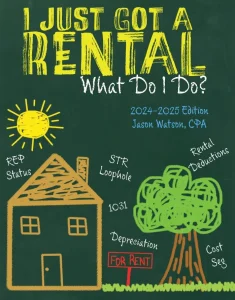
Business Advisory Services
Everything you need to help you launch your new business entity from business entity selection to multiple-entity business structures.
Hey - Our site just had a makeover and we are sorting through the hiccups!
Hey - Our site just had a makeover and we are sorting through the hiccups!

Everything you need to help you launch your new business entity from business entity selection to multiple-entity business structures.

Designed for rental property owners where WCG CPAs & Advisors supports you as your real estate CPA.

Everything you need from tax return preparation for your small business to your rental to your corporation is here.

Table Of Contents

 Short-term rentals (STRs) have exploded into mainstream investing, and the explosion is accelerating near the end of the year. The idea of owning an Airbnb is now so common that people talk about it the way they talk about starting a new hobby. But beneath the popularity and the glossy marketing, STRs are fundamentally operating businesses, not passive investments, and certainly not “set it and forget it” ventures (unless you turn it over to a property manager and are not concerned about material participation and the STR loophole).
Short-term rentals (STRs) have exploded into mainstream investing, and the explosion is accelerating near the end of the year. The idea of owning an Airbnb is now so common that people talk about it the way they talk about starting a new hobby. But beneath the popularity and the glossy marketing, STRs are fundamentally operating businesses, not passive investments, and certainly not “set it and forget it” ventures (unless you turn it over to a property manager and are not concerned about material participation and the STR loophole).
Short-term rentals demand time, attention, resilience, and a genuine entrepreneurial streak—not just a down payment and a positive attitude.
For anyone considering an STR, the real dividing line is simple: Do you want the reality of an STR or the idea of an STR? The idea is charming. The reality is competitive, sometimes messy, and deeply dependent on the operator’s ability to run a hospitality-oriented business with consistency and calm. When you understand that core truth, the STR world becomes both more realistic and more exciting, because you can finally evaluate it for what it truly is.
One of the first misconceptions STR owners face is the belief that demand automatically flows to a good property. While location, amenities, and pricing still matter, the modern STR marketplace is flooded with supply. In many cities, suburbs, and vacation destinations, guests have dozens—sometimes hundreds—of nearly identical options. Airbnb and Vrbo act as hyper-efficient comparison tools, allowing travelers to conduct side-by-side evaluations of properties with remarkable precision.
This abundance leads to an unexpected dynamic: Guests often choose between two similar listings based on extremely small, even whimsical differences. Operators consistently report that travelers obsess over features that barely affect the stay but heavily influence perceived value, such as the availability of free pool heat, the type of coffee setup, the theme of a children’s bedroom, or whether checkout is at 11 a.m. or noon. These micro-preferences might feel irrational to real estate investors, but in a crowded marketplace, they play a meaningful role in conversion, pricing power, and overall performance.
Sidebar: After the sexiness of a big tax deduction from your cost segregation study paired with the short-term rental loophole, you are still left with a business that needs a lot of your attention.
Successful operators understand that STR competition is not about overwhelming differentiation—it is about subtle enhancements that create a sense of value. This is the idea of a “distinction without a difference,” and while the improvements may seem trivial, they often determine which property rises to the top of the search results and which one lingers at the bottom of the screen.
You need to embrace this, and let your maverick side show. The guy across the street from your Airbnb rental, you know, Bob, the STR owner who helps you out from time to time, is your competition.
People often enter the STR world imagining they are investing in real estate. What they are actually doing is entering the hospitality business. Running an STR requires constant problem-solving, expectation management, and rapid communication. It takes someone who can adapt quickly, remain calm when things go wrong, and see patterns in guest behavior rather than react emotionally to every review or request. Even the most beloved airline or hotel chain has bad reviews. Learn. Deploy. Move along.
The operators who succeed tend to be those with an entrepreneurial bone—a natural comfort with the uncertainties and demands of a business that runs every day, not once a month. STR owners must demonstrate a blend of roles that look more like a startup founder than a landlord:
For some people, this blend is energizing; for others, it is exhausting. There is no moral judgment either way, but misalignment between personality and STR demands is one of the leading causes of burnout. Realistic awareness of one’s own temperament is just as important as financial modeling. Read that again. So the math checks, neat, but does your heart and guts check?
If it were easy, everyone would do it (but it wouldn’t have meaning, would it?). STRs are hospitality startups, not rentals. Do you brag it up at a party that you own a startup? Maybe. When owners treat their STR like a startup—with iteration, customer feedback, and strategic upgrades—they outperform the market.
A unique wrinkle in STR investing is the emotional connection many owners feel toward the rental property, especially when they use it personally or choose finishes based on their own preferences. This attachment is natural, but it can lead to decision-making that prioritizes owner taste over guest appeal or operational efficiency. The property begins to feel like a personal reflection, and criticism—whether fair or not—starts to feel personal as well.
Emotional attachment often leads to over-spending on décor, furniture, or design elements that guests neither notice nor value. It can also result in underpricing due to a desire for high occupancy, or ignoring guest feedback because it conflicts with the owner’s preferences. STRs reward operators who treat the property as a product rather than a personal project, analyzing data and reviews with objectivity and adjusting accordingly. When hosts remain emotionally neutral, the STR becomes easier to manage, easier to improve, and far more profitable.
Sure, one day you might take it offline, spritz up the flooring, spray on some new paint, and make it your second home. That’s wonderful! On the way there, however, be agnostic and emotionally detached.
Another common pattern among new STR owners is the assumption that success is simply a matter of listing the property and waiting for the bookings to roll in. Yeah, this reduction might not be fair but the point remains. This confidence—born from seeing the highlight reels of other operators—can quickly disappear once real guests start arriving. STR investing often suffers from a classic Dunning-Kruger curve: many owners begin with high confidence and low understanding, only to find out how complex the business truly is. Who the heck are Dunning and Kruger? It doesn’t matter, the realities that newcomers frequently underestimate include:
The irony is that STR success does not require genius; it requires preparation and tenacity. Operators who assume the business will be hard generally outperform those who assume it will be easy. Humility becomes a strategic advantage because it builds systems, contingency plans, and pricing discipline.
Keep your eyes on the long-term prize! Ebbs and flows are natural on the way to building wealth. Look at Apple or Tesla stock.
In a competitive STR environment, guests often compare properties based on small touches that influence their perception of quality, convenience, or hospitality. This is where micro-differentiation becomes a powerful tool. Operators who strategically choose small enhancements often achieve better reviews, higher occupancy, and stronger pricing, even when the improvements are modest.
Some of the most effective micro-differentiators include:
The list goes on and on.

Continuous improvement, right? Six-sigma kind of approach to your short-term rental can be fun, and also make the difference.
Anyone who has operated an STR for even a short period learns quickly that guest behavior is unpredictable. Even the most detailed instructions, the clearest house manuals, and the most intuitive layouts cannot eliminate confusion, miscommunication, or the occasional frustrating review. What distinguishes strong operators from struggling ones is their resilience.
The reality is that STRs expose owners to guest behaviors ranging from charming to absurd. You will encounter travelers who cannot locate the WiFi password printed in multiple places, guests who find creative interpretations of “no pets,” and reviewers who deduct stars for issues they never reported during the stay. These moments require professionalism, not panic. Operators who develop a composed, systems-driven approach to guest issues maintain better ratings, lower stress, and a healthier business overall.
As we briefly mentioned above, and the concept that pound in our rental property book and other writings, the tax benefits of STRs—particularly the short-term rental exception (loophole) and the potential for accelerated depreciation through cost segregation—are frequently highlighted in online discussions. While these benefits can be significant, they cannot rescue a poorly chosen property. STRs must stand on solid investment fundamentals: market demand, revenue potential, local regulations, competitive saturation, and operating costs all determine long-term viability.
Once the investment is strong, then the operational layer determines success. STRs are businesses operating within real estate, not the other way around. This means that revenue management, guest experience, and operational resilience matter just as much as property selection. Only after the investment and the operations are sound do the tax advantages become meaningful—and at that point, they amplify success rather than compensate for weaknesses.
One of the most strategic ways to approach STR investing is to treat the short-term period as a temporary phase rather than a permanent business model. If an investor can operate an STR effectively for a single tax year, they may capture significant tax benefits while simultaneously testing the property’s market performance. After that initial year, converting the property to a long-term rental (LTR) can provide stability, reduced operational effort, and more predictable income.
This pivot strategy appeals to investors who want the upside of STR tax strategy without committing to long-term hospitality operations. It also reduces burnout risk, allows the property to mature into a more passive asset, and preserves flexibility if local regulations change. The STR → LTR pathway is essentially a sprint during year one followed by a steady marathon for the years that follow.

Learn more about the short-term rental loophole, and how when paired with cost segregation and accelerated depreciation, they can be businesses that offset high W-2 income.
Short-term rentals can be exceptional investments, sometimes outperforming traditional real estate by a wide margin. They can also be powerful tax strategies, especially for owners who meet material participation tests coupled with average guest stays 7 days or less, and understand how to structure their operations effectively. But none of the upside replaces the need to treat an STR as a genuinely competitive business.
The recipe for STR success is straightforward but non-negotiable:
When STRs are viewed through this lens, they become more predictable, more manageable, and ultimately more profitable. They are not effortless, and they are not passive, but for the right operator, they are one of the most dynamic wealth-building tools available.
 I just got a rental, what do I do? Purchasing a rental property is certainly challenging, but operating one to build wealth and find tax efficiency is equally challenging. This is our second book. Our first book, Taxpayer’s Comprehensive Guide to LLCs and S Corps, was first published in 2014 and was well-received by small business owners and tax professionals, so we thought a book on rental properties and real estate investments would be equally helpful. So, here we are with our second iteration, or the 2025 edition. We update it frequently throughout the year (last update was October 6, 2025).
I just got a rental, what do I do? Purchasing a rental property is certainly challenging, but operating one to build wealth and find tax efficiency is equally challenging. This is our second book. Our first book, Taxpayer’s Comprehensive Guide to LLCs and S Corps, was first published in 2014 and was well-received by small business owners and tax professionals, so we thought a book on rental properties and real estate investments would be equally helpful. So, here we are with our second iteration, or the 2025 edition. We update it frequently throughout the year (last update was October 6, 2025).
Our rental property book starts with entity structures and moves into asset management such as acquisition, cost segregation, rental safe harbors, repairs versus improvements, accelerated depreciation, partial asset disposition, and 1031 like-kind exchange. From there we discuss various rental considerations like passive activity losses, short-term rental loophole, real estate professional status, and material participation including what time counts, and what time doesn’t count.
Finally, the good stuff! Rental property tax deductions such as travel, meals, automobiles, interest tracing, home office and common expenses. Fun!
It is available in paperback for $19.95 from Amazon and as an eBook for Kindle for 15.95. Our book is also available for purchase as a PDF from ClickBank for $12.95.
WCG has a team of real estate CPAs ready to assist you with your rental property and real estate investments. Very few tax professionals and CPA firms specialize in real estate to provide you solid consultation, tax planning including tax reduction strategies, and tax return preparation. We are experts in-
This book is written with the general rental property in mind. Too many resources tell you the general rule but don’t bother to back it up with Internal Revenue Code, Treasury Regulations and Tax Court cases. Our book lays it all out, explains the madness, adds some humor and various conundrums. Example? Water heaters and hot tubs- crazy stuff to consider.
Enjoy! And please send us all comments, hang-ups and static. This book is as much yours as it is ours, except the tiny royalty part- that’s ours. Stop by and we’ll buy you a beer with the pennies.
If you buy our 480-page book and think that we didn’t help you understand rental property tax laws, let us know. We never want you to feel like you wasted your money. If you are ready to add some insightful reading into your day, click on one of the preferred formats. Amazon is processed by Amazon, and the PDF is safely processed by ClickBank who will email you the PDF as an attachment.
 |  |  |
| $19.95 | $15.95 | $12.95 |
Yep, and sometimes a chaotic one. STRs are hospitality startups disguised as real estate, and the operators who treat them like genuine businesses tend to outperform the “set it and forget it” crowd. Hope is not a strategy.
Because guests have endless choices, and comparison platforms make it easy to nitpick. People will spend an hour deciding between your place and the one across the street with slightly cooler coffee pods.
It’s the tiny stuff that nudges guests toward your listing—better bedding and linens, a thoughtful guidebook, or a pet-friendly setup that feels intentional. Small upgrades often move the needle more than big remodels.
Pretty much, yes. If problem-solving, people-managing, and making decisions under pressure drain your soul, STRs may feel like a full-time job you never applied for.
Because the business doesn’t stop. Turnovers, guest messages, cleaning snafus, and price adjustments create constant pressure, and operators without systems eventually hit the “I’m done” wall. Converting to a long-term rental or your second home are good options, however.
Not at all—but mixing personal attachment with business decisions gets tricky. The more emotionally connected you are, the harder it becomes to make objective, profitable choices. Be mindful of vacation home rules (14 days or 10% of fair rented days not including maintenance days, max).
Absolutely. Guests rarely book based on number of beds alone—they book based on how the place feels. A few thoughtful touches can push your listing ahead of a dozen competitors.
Assuming bookings will magically appear. STR success depends on pricing, presentation, operations, and responsiveness—not just buying a house and crossing your fingers.
They can be fantastic in the first year, as long as you meet material participation requirements and average guest stay, and you couple that with accelerated depreciation. The tax tail shouldn’t wag the business dog, but it can be a powerful bonus (pun intended). Keep in mind that this is a year 1 sort of thing- the shine wears off in subsequent years and you focus mainly on cash flow.
Many owners do, and it’s often a smart move when you cannot turn a profit. Run it as an STR for a year for the tax benefits, then convert to an LTR if you want stability, lower effort, or just your sanity back.

Want to talk to us about tax return preparation, tax planning and strategy, and all the other things that go with it? We are eager to assist! The button below takes you to our Getting Started webpage, but if you want to talk first, please give us a call at 719-387-9800 or schedule an discovery meeting.
Jason Watson, CPA is a Partner and the CEO of WCG CPAs & Advisors, a boutique consultation and tax preparation CPA firm serving clients nationwide with 7 partners and over 90 tax and accounting professionals specializing in small business owners and real estate investors located in Colorado Springs.
He is the author of Taxpayer’s Comprehensive Guide on LLC’s and S Corps and I Just Got a Rental, What Do I Do? which are available online and from mostly average retailers.
Table Of Contents

Tax planning season is here! Let's schedule a time to review tax reduction strategies and generate a mock tax return.

Tired of maintaining your own books? Seems like a chore to offload?
Did you have questions about how this works? Do you need to bounce some ideas off of our rental expert team?
The tax advisors, business consultants and rental property experts at WCG CPAs & Advisors are not salespeople; we are not putting lipstick on a pig expecting you to love it. Our job remains being professionally detached, giving you information and letting you decide within our ethical guidelines and your risk profiles.
We see far too many crazy schemes and half-baked ideas from attorneys and wealth managers. In some cases, they are good ideas. In most cases, all the entities, layering and mixed ownership is only the illusion of precision. As Chris Rock says, just because you can drive your car with your feet doesn’t make it a good idea. In other words, let’s not automatically convert “you can” into “you must.”
Let’s chat so you can be smart about it.
We typically schedule a 20-minute complimentary quick chat with one of our Partners or our amazing Senior Tax Professionals to determine if we are a good fit for each other, and how an engagement with our team looks. Tax returns only? Business advisory? Tax strategy and planning? Rental property support?

Everything you need to help you launch your new business entity from business entity selection to multiple-entity business structures.

Designed for rental property owners where WCG CPAs & Advisors supports you as your real estate CPA.

Everything you need from tax return preparation for your small business to your rental to your corporation is here.


